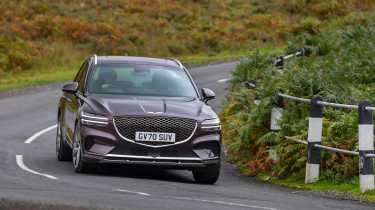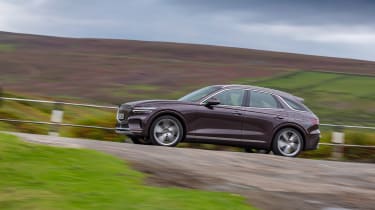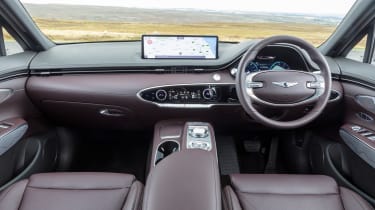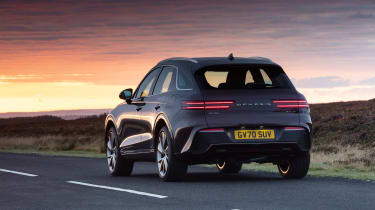Genesis GV70 2022 review – can it crack the popular BMW X3 and Audi Q5 market?
The GV70 is proof how quickly Genesis is moving forward, but limited engine choice ultimately holds the newcomer back
If there is a model to give new premium-class player Genesis a good hard go at breaking into the European market, it’s got to be this one. The Genesis GV70 is a midsize premium SUV that’s designed to compete directly with the BMW X3, Audi Q5, Mercedes GLC, Volvo XC60, Lexus NX, Jaguar F-Pace, Porsche Macan, Range Rover Velar, Alfa Romeo Stel… you get my point. Yet despite the sheer number of rivals it will need to compete with, the compact premium SUV class is an ideal market for any new players with a strong product to flourish in, its eager customers often bothered less about the brand loyalty of the classes above. Plus, the GV70 has true global appeal – this is not a niche player like the G70 Shooting Brake.
To give itself the best chance to succeed, the GV70 isn’t just a rebadge of an existing SUV within the Hyundai/Kia conglomerate. Instead its chassis is shared with its larger Genesis siblings, giving it a rear-biased technical layout, with longitudinally mounted engines and their inherited traits including excellent noise, vibration and harshness suppression and a balanced driving nature, not to mention a set of proportions that don’t look too far away from those of an Aston DBX. And as you approach the GV70, it’s the striking design that immediately impresses. It shares many of the same design fundamentals as its siblings – the twin-bar lighting front and rear, generous grille proportions and general, sometimes fussy, detailing. Yet look closer and the GV70’s lines and surfaces all look just that little bit more expressive, giving the 70 a more energetic quality that goes with its smaller dimensions.
It’s especially noticeable at the rear, where the sloping roofline and impossibly slim lighting look striking and fresh, with a distinctive night-time signature that’s topped off by one hell of a third brake light. This is certainly a car with showroom appeal (if Genesis had them), and it’s a feeling that continues inside the cabin. Here you’re greeted with a sumptuous interior. Material quality is top notch, but it’s the overall design that really stands out and the digital interfaces which are simple to operate, yet still fresh. The tech inside those interfaces is also brilliantly executed, being crisp and quick to respond, and the click-wheel makes it easier to navigate than other function-heavy systems found in the latest Mercs, Audis and BMWs.
More reviews
So far so good. But it’s easy enough to make an SUV look and feel nice at this price point. Making one drive well, however, is much more difficult. And this is something the GV70 does with varying degrees of success. The basic handling balance is very obviously set up for comfort, and that it does extremely well with superbly suppressed road and powertrain noise, great bump absorption and general refinement around the suspension. Speed things up a bit, though, and things get a little woolly. The steering has a relatively fast rack and, while precise, it doesn’t take long for the body control to lose its battle against the inherently low spring rates. At higher speeds the steering also gets a tad rubbery, and kickback can start transmitting through the rack as its loads increase. It’s certainly not in the same league to drive overall as a Porsche Macan, Jaguar F-Pace or Alfa Romeo Stelvio, but against rivals from Audi, Mercedes and Volvo it’s perfectly adequate, and in this class that’s all it needs to be.
The powertrain options have their own highs and lows – the 300bhp turbocharged 2.5-litre petrol is all but completely inaudible unless you’re at some serious revs, and with enough torque (311lb ft) to keep you moving along with traffic without the need to dig into the higher rev band, it makes for a very comfortable and relaxed proposition on long journeys. The compromise is its appetite for fuel, with anything more than 25mpg considered a good result. Genesis is also offering a 206bhp/324lb ft 2.2-litre diesel that bumps up this number by about 8-10mpg, but curiously there are no hybrid options, something that’s almost become a class requirement since the popularity of diesels took a nosedive. There is an all-electric variant on the way to make up for it, but for now in Europe, engine options are the GV70’s weakest link, as neither petrol nor diesel are terrifically efficient, which counts against them on company car lists and tax bills in equal measure.
The rest of the running gear is perfectly fine, though. The eight-speed auto is smooth, responsive and not overkeen to kick down for no appreciable reason. The all-wheel-drive system’s rear bias feels a bit lost in the drive – there’s no sense this is mostly rear-wheel drive unlike an Alfa Stelvio – but then the powertrain doesn’t have the guts to reveal any playful antics, so it’s no great loss. Instead, the Genesis GV70 feels like what it essentially is – a luxury SUV made to lead on comfort and refinement over secure handling and efficiency.
Prices and rivals
If said comfort and refinement are what you’re after in a premium family SUV, the GV70 could very well be worth putting on the shortlist if alternatives with a similar skill set, such as the Volvo XC60, Mercedes GLC or Audi Q5, are also under consideration. But if you're thinking this SUV might have a Porsche Macan or Jaguar F-Pace beaten down a twisty road, it’s probably not the car for you.
It’s also worth noting that despite its premium status and good equipment list, the GV70’s base price is actually very competitive, starting at £39,450 for the entry-level 2.2-litre diesel, with Sport Line and Luxury Line trims costing an additional £2350 and £3370 respectively. The 300bhp petrol will cost an extra £1550 regardless of chosen trim. From here prices get steep for the high-end options, such as the £2350 Nappa leather and the £4190 Innovations pack that includes a combination of active safety and autonomous driver aids, a head-up display and auto parking system.







